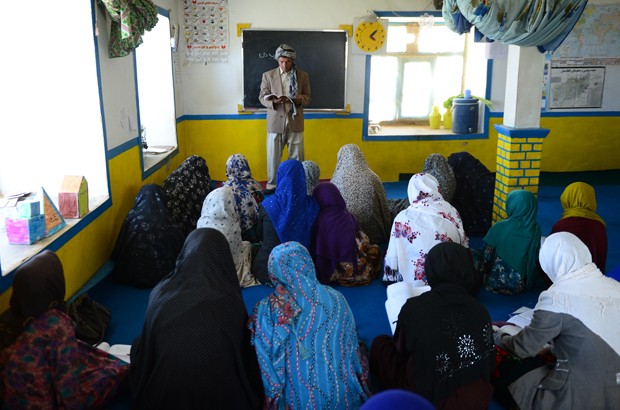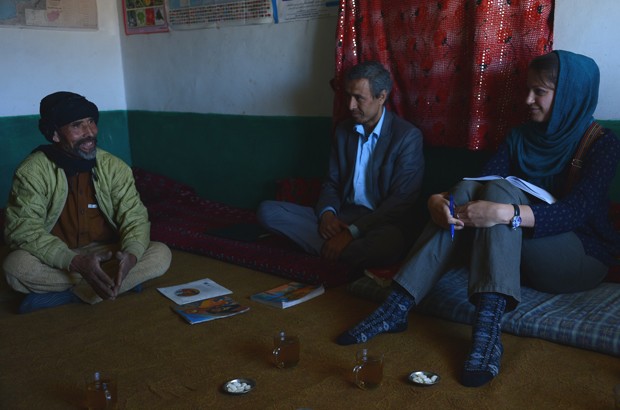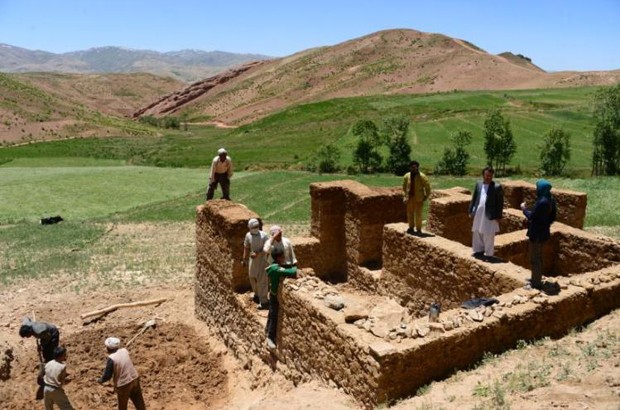I visited Ghor province in Afghanistan in June 2015 as part of my work for STAGES project, one of the UK-funded Girls’ Education Challenge programmes. I went there to see the work being carried out by one of the partners, which I won’t name for security reasons, but which is doing incredibly important educational work in rural communities.
After hours spent on the road from Bamyan, the neighbouring province, I discovered a village in the mountains of Ghor, where cars have to park at the bottom of a hill and passengers walk up to a community of mud houses, accompanied on their journey by sheep and turkeys. It’s a place where the teacher confuses the pictures for the words cherry and apricot during an English lesson because neither he, nor any of the students, have ever seen these fruits.

It is so remote that it has never had a school. The sixty families who live there had never had access to education until the STAGES project opened two community-based classes. Children followed in the footsteps of their parents, herding sheep, growing subsistence crops and helping with housework. Yet when the project explained that that it wanted to establish classes, the community immediately accepted, understanding the value of education from the start. Five community members volunteered for the school management committee and organised the community to clean and repair a space in the mosque for classes. Today, 20 children attend a community based primary class and 27 teenage girls are enrolled in accelerated learning classes where they study two grades in one year.
Abdul Rahman, a small wizened man with lively eyes is waiting for me in his home where he has provided a room for the community library, with books provided through the STAGES project. This year the village holds the record amongst the NGO’s focus communities for the most books borrowed, with some 2,000 books borrowed during the winter.

In spite of the challenging context, the village pooled its resources to build their own school. “Before, people didn’t work together to improve the community, so I decided to become a school management committee member to help coordinate activities and bring change,” Abdul explains. He decided to visit each family to convince them to help build a school: “It wasn’t difficult to convince people because every family has children. Education is everyone’s concern.” School management committee members collected money to rent a tractor to bring stones to the building site and the community organised shifts of ten people to build the foundation and raise walls. Everyone in the community helped, donating materials, bringing water and food for the workers or contributing their labour.

Abdul Rahman proudly takes me to the building site. Everyone is at work mixing mud and passing it to the men perched on top of the walls. The school will have three rooms; one for the primary class, one for the accelerated learning class and one for the library. Walking on the walls, I can appreciate the size of the building and the sense of great hope the community has for the future of Afghanistan. The potential of the people and what education can help them achieve is clear.
As part of STAGES project and to encourage ownership of classes established, communities have to donate classroom and library space as well as shura volunteer time. Sometimes communities decide to go the extra mile and donate books, repair material for classes or even build wells or school buildings such as the one observed in Ghor. The project has already recorded £735,267 of in kind contributions, demonstrating Afghans’ overwhelming engagement in the education of their children and their commitment to build a better future.
---------------------------------------------------------------------------------------------------
Please note, this is a guest blog. Views expressed here do not necessarily represent the views of DFID or have the support of the British government.
---------------------------------------------------------------------------------------------------

2 comments
Comment by Sylvie posted on
Well done my Sarah ! I am very proud of you Kisses fromTati Sylvie
Comment by ADAMU SALIFU posted on
IT IS IN DEED A GREAT PLEASURE TO HAVE SEEN THAT THERE ARE STILL PEOPLE IN THIS OUR MODERN PLANET WHO DO NOT HAVE ACCESS OF EDUCATION. NOW , WHAT CAN WE DO ABOUT THIS? THIS HAS TO DO WITH CONCERNING EDUCATORS TOGETHER WITH THE GOVERNMENT OF THE COUNTRIES AND ABOVE ALL UK AID NEED TO PROVIDE AN IN - SERVICE TRAINING FOR THE VOLUNTEERS { EDUCATORS } THIS MAY LAST FOR A PERIOD OF SIX MONTHS. AND AFTER THE TRAINING, THE TRAINEES MAY NEED TO SERVE FOR ANOTHER SIX MONTHS BEFORE HE OR SHE CAN BE ISSUED FOR A CERTIFICATE.I BELIEVE THIS CAN DO MORE GOOD AND EMPOWER OUR PEOPLE IN PLACES OF NEEDY.
I SAY A BIG THANKS TO SYLVIE AND UK AID.
ADAMS.